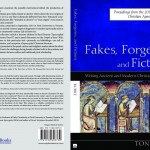It makes for natural sermon fodder but is very puzzling as part of the narrative of Gospels. How does one make sense of the several stories in the New Testament Gospels, in both Luke and John, in which Jesus is not recognized? It is great preaching material: Just ask how often we fail to recognize Jesus, in those whose humanity we fail to recognize, in the poor and marginalized, in the breaking of bread and fellowship.
But that kind of application doesn’t explain why the stories are in the Gospels, what they meant to the authors and earliest readers. There may be a number of explanations that could make sense, including that this simply reflects the kinds of experiences that early Christians had and retold, to convictions about how the resurrection body would be different from the present one.
One thing, however, became clear to me as I explored this topic with my Sunday school class recently. These are not the kinds of stories that the early church would have invented if they were conspiring to create a new religion that will persuade others. They are not the stories that would be told if the aim were to provide watertight arguments for their position and eliminate doubt.
Instead, the texts themselves tell us that the very people who participated had doubts and uncertainties. Matthew 28:17 tells us right in the context that offers the “Great Commission” that “some doubted.” John 21:12 says that none of them asked who this individual was that they were having breakfast with: “they knew it was the Lord.”
From the perspective of a historical scholar of Christian origins, this might lead to an exploration of the possibility that the apostles, working through the trauma of the execution of Jesus and the disappointment of their hopes, interpreted mundane experiences in ways that others would not have. From the perspective of anyone, depictions of Jesus showing up recognizable, often the only one there dressed in white, is not only departing from what the text says, but contradicts what the text says and what it implies.
Yet there is something encouraging and hopeful in this, for at least some Christians. Obviously for those whose faith is about a book and in a book, these details are problems to try to solve, contradictions to reconcile, disconcerting and puzzling stuff to be hidden away lest it become fodder for an opponent. For others of us, however, faith is a humble recognition of our own uncertainty and the fact that not only do we not know it all and have all the answers, but when it comes to God by definition we could never hope to have all the answers and a full and correct understanding. For others of us our faith is in God, not in the collection of human writings but the one those writings tell us our faith ought to be in. For us, these texts show us how to proceed. With all their doubts and uncertainties, the early Christians had powerful life-changing encounters with God and with Jesus that transformed them dramatically. They told their stories, without skipping all the awkward details. We can do the same. Stories like that in John 21 invite us to do the same.
I don’t know about you, but as a Christian engaged in the historical study of Jesus, who has found himself deeply unsettled after initially hoping that the investigation might yield definitive proof of what I was inclined to believe, or at least something clearer and more compelling than what I now see there, I find the stories as I now understand them to be encouraging rather than disheartening.
What about you?













